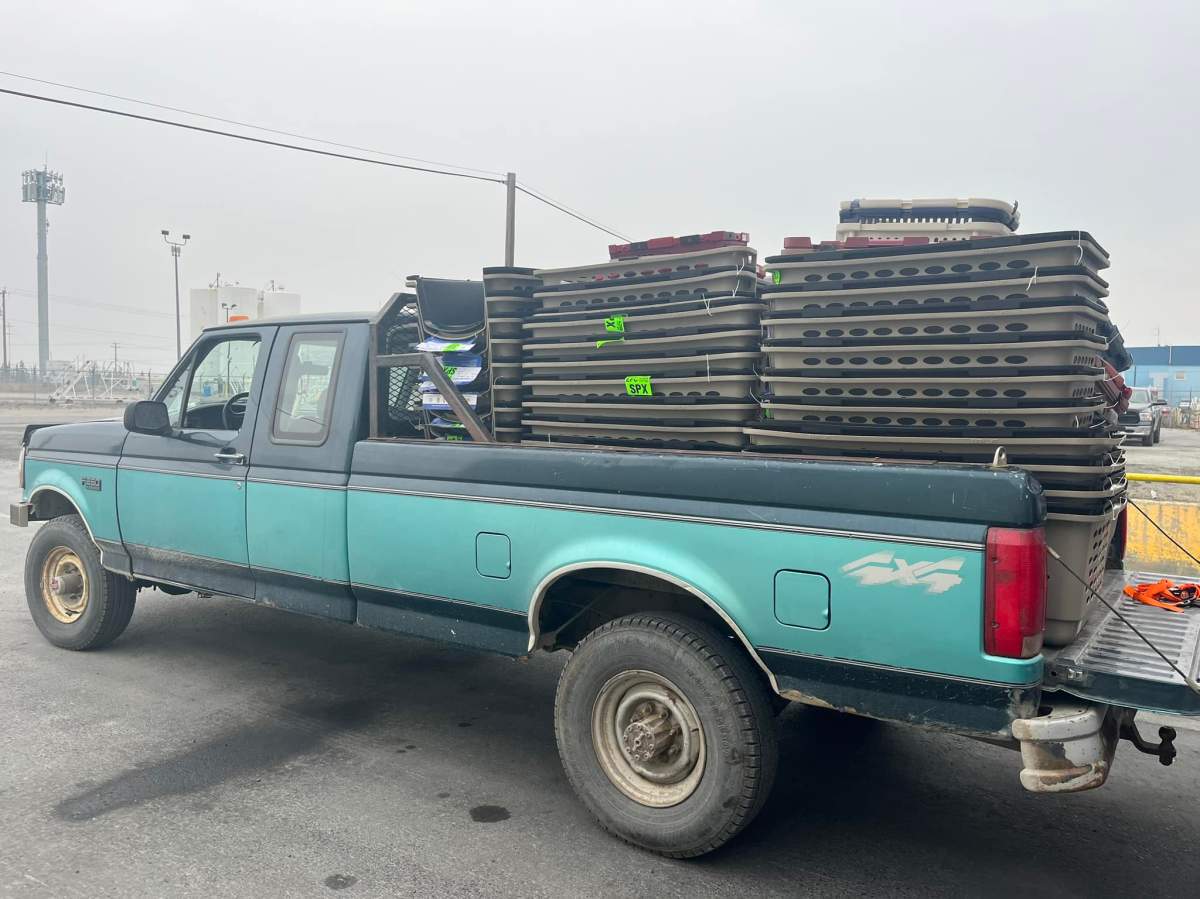Yellowknife veterinarian Michelle Tuma was having a hectic month even before an encroaching wildfire forced the mass evacuation of her home community.

Nothing prepared her for the chaos of getting thousands of people out of the city, but Tuma focused her efforts on making sure evacuees could take their animals with them and on protecting at least some of those left behind.
“I know how much pets mean to people,” Tuma says.
“I can’t even imagine having to evacuate and not being able to take your pets, and it’s the least I can do to be here and help support those people who are already so stressed and so anxious.”
The 20,000 residents of the capital of the Northwest Territories were told late Wednesday that they to be out by noon Friday. They packed up their bags, vehicles and furry friends and started to stream out of the city.
But fleeing the North with a pet isn’t simple.
Born and raised in Yellowknife, Tuma is the northern Canada veterinary specialist with Veterinarians Without Borders and operates her own practice in the city.
She had already been providing veterinary support to other N.W.T. communities forced to evacuate during this unprecedented wildfire season. Earlier this week, she was in Behchoko, Hay River and Enterprise, a hamlet all but devastated by fire.
“The last few weeks have been so busy that I have no idea what day it is, what time it is,” Tuma says.

As evacuation orders are issued, people are often loaded into buses or vans and animals aren’t allowed. Pets also aren’t always allowed on flights or are required to be in an animal carrier, which not everyone has.
These considerations slow down evacuations when time is critical or make people stay behind because they don’t want to leave their furry family member, Tuma says.

Get breaking National news
“That’s one of the most heartbreaking reasons why people don’t want to evacuate or just a reason of deep, deep sadness when they do evacuate and can’t bring their pets.”
Tuma says Yellowknife’s slow evacuation over two days allowed time for some people to make room for pets in their vehicles.
Veterinarians Without Borders also sent in animal crates from elsewhere in Canada so pets could go on planes. Some airlines also loosened rules allowing animals to be on board on leashes.
Tuma says she’s working with N.W.T. SPCA to find support for animals left behind. The organization flew 41 animals south Friday morning.
There have been a lot of other efforts to ensure animals in the area are kept safe.
A convoy of trucks and livestock trailers from Alberta drove to Yellowknife to transport horses and donkeys from a stable south to wait out the fires. Local social media pages are also filled with offers to drive animals to safety.
Grant Beck lives outside of Yellowknife near Cam Lake, where he runs Beck’s Kennels, a dogsledding business that has 170 dogs.
With flames recently 25 kilometres from his home and a semi-load of dog food in the freezer, conditions for him and his animals are safe, he says. If things deteriorate, he’s not worried.
“We know how to move dogs around,” he says. “If I had to, I’d just move them down to the lake and ferry them out to an island. It’s not like we have to load them up and move them down to Edmonton.”

For pets that have made it safely south, the challenge doesn’t necessarily end. Many evacuation centres and hotels don’t allow pets.
“There’s lots of panic because not every evacuation centre is pet-friendly,” says Melissa David, who runs Parachutes for Pets in Calgary.
The pet charity is preparing to help animals from Yellowknife. Evacuees were likely just grabbing what they could for themselves, their children and their animals before leaving, she says.
“Obviously, people have left in a hurry and maybe not taken pet medication or pet foods or harnesses,” she says.
David says she has already been receiving calls and messages, and anyone with an animal can reach out for help.
Back in Yellowknife, Tuma gets emotional speaking about all the support she’s received in the city and from people across Canada.
“That’s why I love the North and that’s why I love Yellowknife and I love that this is my hometown,” she says.
“Because when we need to do things for each other, everybody shows up willing and ready to help out.”

— With files from Bill Graveland in Calgary and Bob Weber in Edmonton











Comments